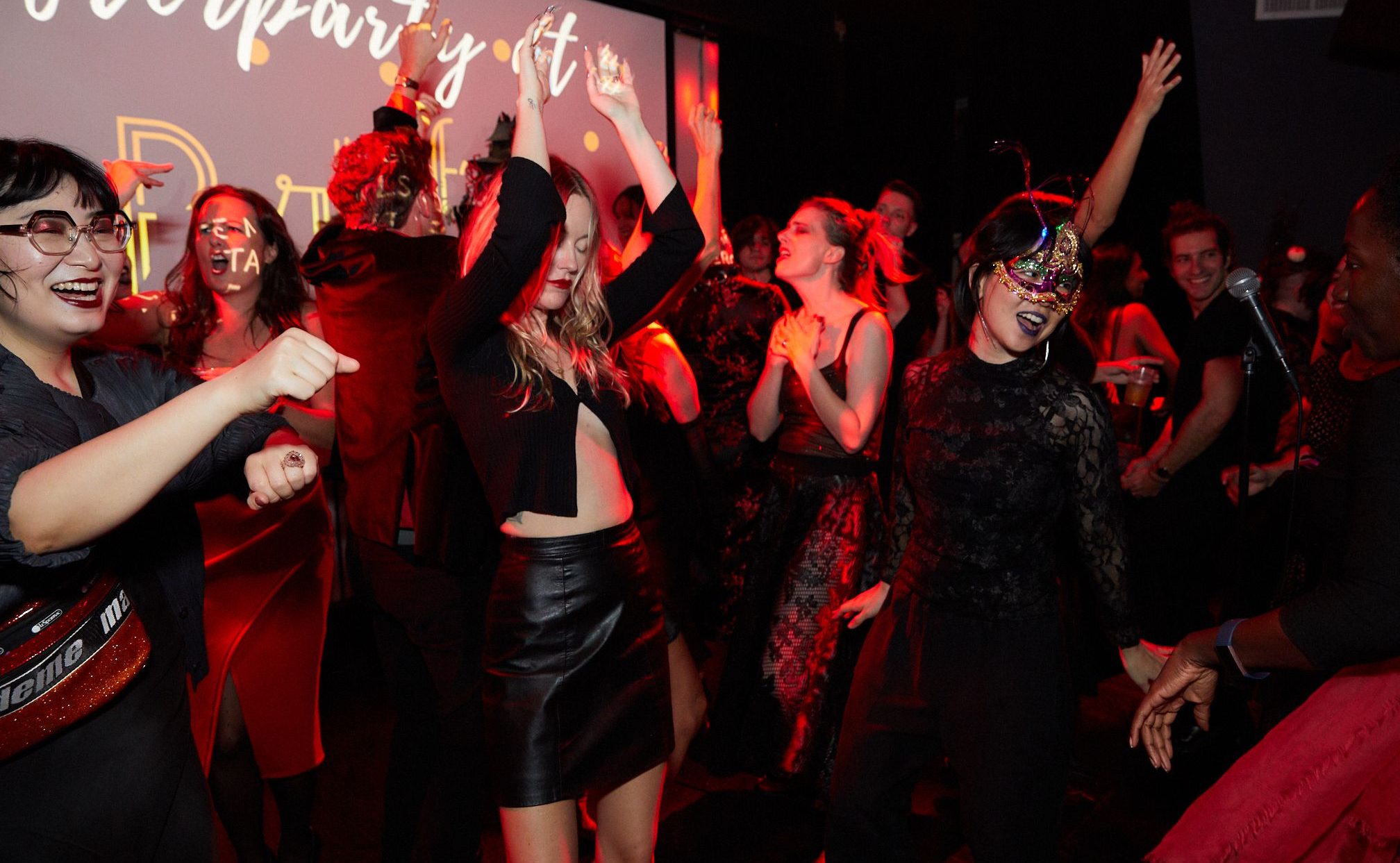news
Three Years of Franklin Park Reading Series!

1. Laura Peterson, Architect at KPF, Becca Kaplan, Agent’s Assitant at WME, and Cynthia Plasschaert, Executive Assistant. Cynthia wins Best Spelling of Surname 2012, awarded by me. There’s no money. Sorry. 2. CROWD

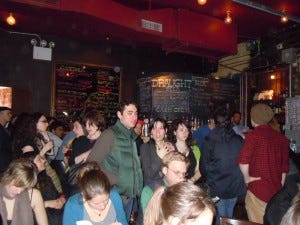
Franklin Park Bar is now about five blocks away from my new apartment, which is both dangerous and supreme. It also means travel time to the Franklin Park Reading Series every second Monday is considerably shorter. Last night the ever-awesome Penina Roth and crew celebrated three years of reading revelry at the Crown Heights watering hole with readings from Ben Townsend (Stonecutter Journal), John Dermot Woods (The Complete Collection of People, Places & Things), Melissa Broder (Meat Heart), Adam Wilson (Flatscreen), Shalom Auslander (Hope: A Tragedy) and candy from The Candy Rush. How could anyone beat that?
1. One of John Dermot Woods’ illustrated shorts. From here it looks the dude has a giblet caught at the corner of the mouth. Hehe. 2. This is awesome.
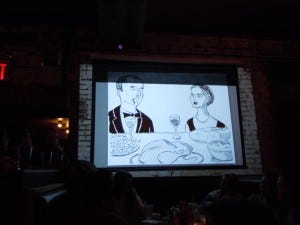
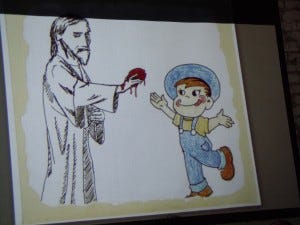
March’s installment of the reading series was “multimedia and multi-genre” with two novelists, one essayist, poet, and graphic novelist. The reading also helped celebrate Small Press Month. Two of the authors, Melissa Broder and John Dermot Woods, have books forthcoming or out on Publishing Genius Press and are reading together later this week. If there’s any reading series that promotes the writers’ community it’s this one: though there are a couple hundred people inside of FP’s big room every month, the readings are no less intimate than a small store with five. Without getting too hippy-dippy or free-lovey, I look forward to coming every month because it is consistently a good time with great people and awesome literature. Win.
1. Melissa Broder, who only read a handful of poems, despite having 50 more. 2. Asa Needle, who works at Worcester Roots Project, a Non-Profit, with Rebecca Haze, Staff Writer at Art Faccia.
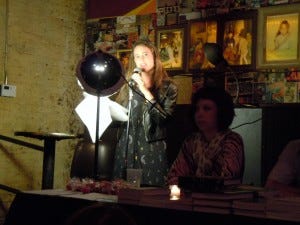
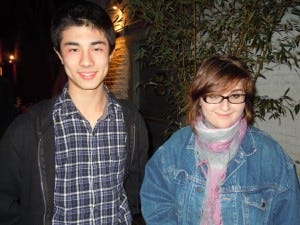
Ben Townsend, whom Penina espied at another Crown Heights reading series called Renegade, was an “unremarkable” college freshman in late 2005. The term “stalker” was in the middle of redefinition, with “everyone on campus going crazy for a site called ‘the Facebook dot com.’” Townsend received a disconcerting message from his academic advisor, notifying him that she’d found something “troubling.” Though it could have been “a picture of a panda smoking … they’re endangered,” it was a love letter to one of Townsend’s professors signed in his name. It only got weirder. Our stalker, Roger, revealed himself through a steady litany of love letters to Townsend. One of which emerged from Townsend’s packets creased and bent, decorated in red lipstick kisses, and went like this: “I want to have wild doggy style sex … Let’s have wild feral sex … The world could not huff and puff and blow the hardness down … I know someone with a bull whip we can borrow. Love, Roger.” Townsend’s delivery fit the venue perfectly — punctuated with non-sequitur asides and a comfortably quick pace. His essay sounded more like a great bar story and made “wild feral sex” sound hilarious, which now looks painful. Yow.
John Dermot Woods was the evening’s graphic novelist, and read from his image/text novel, illustrated shorts, and one-page comics. The last time I was a read a story with pictures was probably in elementary school, and I was sitting on a carpet. I was unsure how it would work, but Woods’ work took the sentiments of childrens’ stories, which are latent with moral teachings, and inverted them. Ink sketches reminiscent of Raymond Pettibon voiced by deadpan, unadorned prose delivered darkly funny and poignant stories about cats named Always and Sometimes, where “tongue/dream confusion is an existential crisis.” Woods’ forthcoming image/text novel co-written with J.A. Tyler, No One Told Me I Was Going to Disappear, is forthcoming. He also curates Soda Series, a quarterly reading series at Soda Bar on Vanderbilt.
1. Liz Feskoe gettin’ licked by her girlfriend, the inimitable J.E. Reich. One day they will stop being a really cute couple, and I won’t make whined-at-cuteness sounds.
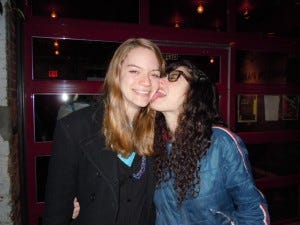
By day, Melissa Broder is a publicity manager at Penguin, edits La Petite Zine, contributes to HTMLGiant, and by night writes poetry books titled Meat Heart. That title is worth at least $50, though thankfully you’ll be able to buy for much less than that. I’m a little afraid of poetry. I don’t read it a lot, nor do I write it, so appreciating its craft is barely visible to me, but Broder’s work greatly helped to better understand. A poem like “Dark Poem” translates the notion that one can find both darkness and humor in something like, say, a knackwurst. “One small girl ate a nach / I watched her eat it in the dark / And felt I was deserved a dark poem.” Broder’s posts on HTMLGiant are often bitingly funny, and point to a sublime core with her wit and sarcasm. A poem that addresses a cult following confirmed that “Jesus wanted barbituates,” and “when God starts humming, I’ll start humming.” In addition to all that she does, she’s also really good at Choose Your Adventure charts.
1. Adam Wilson: “I keep telling him to get it snipped. It would look so much nicer.” Also pictured: Erika Anderson, FPRS’ intern, live-tweeting. 2. Shalom Auslander, reading from Hope: A Tragedy. He rules.
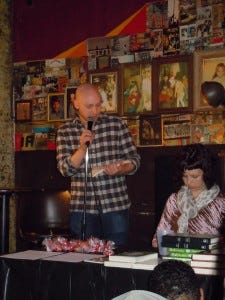
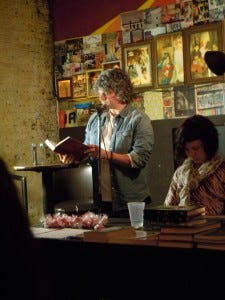
After a short break, Adam Wilson prefaced his reading from his novel Flatscreen with this: “I was going to read from the beginning of the book, but everyone keeps telling me to read a sex scene, so I thought I would read an orgy scene, which I thought was going to be funny, and a bit sad. As most orgies are.” Our narrator, Eli, “spends most of the novel in a bathrobe,” smoking weed, and ingesting various white-colored uppers and downers with an ailing, ex-TV star named Kahn. I’m about a quarter into the novel, and its sentences move fast across intersections of humor and depression, though Wilson’s reading emphasized the sadness underneath our slacker Eli, whose funniest bits are when he’s with others, distracting himself from the reality of robe-life, or openly celebrating it. “‘You two are young, Kahn said. ‘You’ll never die … Only old people and cripples die.’ ‘Let’s get high,’ I said. Kahn nodded.” Flatscreen has been appearing all over the internet since it arrived, with nothing less than excitement and praise. It is one expertly envisioned story of the twenty-something floating in the ’00s. I leave you with this bit: “‘There’s only one rabbi I let touch my dick, and he died in ‘78.’ ‘They’re called mohels, guys who do the circumcision.’ ‘That’s Hebrew for sadist.’”
1. Auslander and Wilson, smoking, pretending I’m not there.
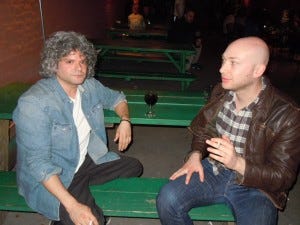
Shalom Auslander turned Wilson’s Semitic sarcasm to the sardonic with a selection from his first novel, Hope: A Tragedy. A Solomon Kugel lives in upstate New York, and finds an old woman hiding in his attic. “‘I’m Anne Frank,’ she grumbled.” Anne Frank is alive, old and furiously types away in Kugel’s attic. This Anne Frank is not the eternally young teenager the world knows — our geriatric Frank loves the word “jackass.” “I have shuddered in Auschwitz … I know it disgraces the memory of those who died … but it was Bergen-belsen, jackass … Blow me, jackass.” While Hope certainly brushes against the grain of Anne Frank’s public memory — and the Holocaust overall — it reminds the reader that all histories continuously loom effervescently, that an individual is in constant reconciliation of time and meaning. “‘Pessimists,’ Professor Jove said, ‘don’t start wars … Have you heard of anything more hopeful than “The Final Solution?”” Hitler’s optimism is what made him a monster, according to the novel, and Auslander’s Anne Frank is simultaneously history and woman in the attic, bothering Kugel physically and emotionally. “Can you imagine the headlines? ‘Jew Drops Dime on Holocaust Survivor.’ … The story gets weirder, the anchor would say. ‘The home owner was a Jew.” No person accepts, s/he is constantly accepting a past.
Congratulations to Penina Roth for three years of one of my favorite reading series ever, a favorite of Dish’s, and many members of the lit world. I tried to think of something really serious and poignant to write in place of this sentence, but I found this to be more than sufficient: it is beyond awesome. Next month Franklin Park Reading Series falls on the third Monday, 4/16, and stars Heidi Julavits (The Vanishers),Touré (Who’s Afraid of Post-Blackness?), Jennifer Gilmore (Something Red), Joseph Riippi (A Cloth House, out Thursday), and Leah Umansky. Go.
***
— Ryan Chang is from Orange County, CA and lives in Brooklyn. He is the Staff Writer for The Outlet, and his work has appeared in Thought Catalog. He is in the internet here and here.







